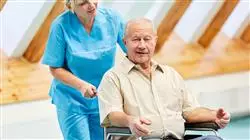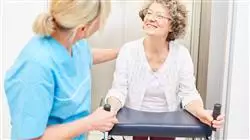University certificate
The world's largest faculty of physiotherapy”
Introduction to the Program
Become a much more effective physiotherapist, able to manage Home Hospitalization Units through this Postgraduate diploma"

Even so, home hospitalization is becoming a benchmark in physiotherapist care, a care focused on people and their health, as well as social needs, and allows healthcare professionals to offer their patients the necessary care and treatment with the same quality as if it were provided in hospital facilities.
In certain cases, when the disease has a stable clinical diagnosis and does not require specific equipment that can only be found in hospitals, it is better for patients to be cared for in their own homes, since the daily routine at home and the tranquility that this space provides the patient make it the most suitable therapeutic location.
Demographic change requires an extreme rethinking of health care, previously focused on acute processes and cure as the primary objective and having hospitals as the center of attention, towards a medicine aimed at care rather than cure and having the person and their closest environment, the home where they live, as the center, without reducing the quality of care or the use of hospital-intensive resources.
This program is focused on deepening the understanding of all aspects which make home hospitalization unique and different from other medical specialties in physiotherapist. It also demonstrates the weaknesses and future opportunities we have ahead of us, making the most of new educative technology available.
The syllabus is presented in a rigorous shape with the latest scientific evidence and clinical cases in which to advance our knowledge, in order to share experiences and innovative techniques that are already performed in different Home Hospitalization Units in other locations.
Improve your knowledge in the care of patients with home hospitalization through this program, where you will find the best educational material with real clinical cases”
This Postgraduate diploma in Home Hospitalization Units contains the most complete and up-to-date scientific program on the market. The most important features of the program include:
- More than 100 practical cases presented by experts in home hospitalization, complex chronic patient management and palliative care
- The graphic, schematic, and practical contents with which they are created provide scientific and practical information on the disciplines that are essential for professional practice
- Latest advances on the role of physiotherapists in home hospitalization
- Practical exercises where the self-assessment process can be carried out to improve learning
- Algorithm-based interactive learning system for decision-making in the situations that are presented to the student
- With special emphasis on evidence-based medicine and research methodologies in home hospitalization
- Theoretical lessons, questions to the expert, debate forums on controversial topics, and individual reflection assignments
- Content that is accessible from any fixed or portable device with an internet connection
With this Postgraduate diploma, you have the opportunity to update your knowledge in a comfortable way and without sacrificing the highest scientific rigor, to incorporate the latest advances in the approach to home care in your daily physiotherapeutic practice"
The teaching staff is made up of prestigious and renowned Spanish professionals, with long careers in health care, teaching and research, who have worked in different hospitals throughout the country, garnering professional and teaching experience that is delivered in an extraordinary way in this Postgraduate diploma.
The methodological design of this Postgraduate diploma by a multidisciplinary team of e-learning experts, integrates the latest advances in educational technology for the creation of numerous multimedia educational tools that allow professionals, based primarily on the scientific method, to face the solution of real problems in their daily clinical practice, which will allow them to progress in the acquisition of knowledge and the development of skills that will impact their future professional work.
It should be noted that each of the contents generated for this Postgraduate diploma, as well as the videos, self-evaluations, clinical cases and exams, have been thoroughly reviewed, updated, and integrated by the professors and the team of experts that make up the working group, to facilitate the learning process with a step-by-step approach in order to achieve the teaching program objectives.
This Postgraduate diploma offers students the opportunity to learn with more than 100 case studies"

This program will help you provide more personalized care to hospitalized patients in their homes"
Why study at TECH?
TECH is the world’s largest online university. With an impressive catalog of more than 14,000 university programs available in 11 languages, it is positioned as a leader in employability, with a 99% job placement rate. In addition, it relies on an enormous faculty of more than 6,000 professors of the highest international renown.

Study at the world's largest online university and guarantee your professional success. The future starts at TECH”
The world’s best online university according to FORBES
The prestigious Forbes magazine, specialized in business and finance, has highlighted TECH as “the world's best online university” This is what they have recently stated in an article in their digital edition in which they echo the success story of this institution, “thanks to the academic offer it provides, the selection of its teaching staff, and an innovative learning method aimed at educating the professionals of the future”
A revolutionary study method, a cutting-edge faculty and a practical focus: the key to TECH's success.
The most complete study plans on the university scene
TECH offers the most complete study plans on the university scene, with syllabuses that cover fundamental concepts and, at the same time, the main scientific advances in their specific scientific areas. In addition, these programs are continuously being updated to guarantee students the academic vanguard and the most in-demand professional skills. In this way, the university's qualifications provide its graduates with a significant advantage to propel their careers to success.
TECH offers the most comprehensive and intensive study plans on the current university scene.
A world-class teaching staff
TECH's teaching staff is made up of more than 6,000 professors with the highest international recognition. Professors, researchers and top executives of multinational companies, including Isaiah Covington, performance coach of the Boston Celtics; Magda Romanska, principal investigator at Harvard MetaLAB; Ignacio Wistumba, chairman of the department of translational molecular pathology at MD Anderson Cancer Center; and D.W. Pine, creative director of TIME magazine, among others.
Internationally renowned experts, specialized in different branches of Health, Technology, Communication and Business, form part of the TECH faculty.
A unique learning method
TECH is the first university to use Relearning in all its programs. It is the best online learning methodology, accredited with international teaching quality certifications, provided by prestigious educational agencies. In addition, this disruptive educational model is complemented with the “Case Method”, thereby setting up a unique online teaching strategy. Innovative teaching resources are also implemented, including detailed videos, infographics and interactive summaries.
TECH combines Relearning and the Case Method in all its university programs to guarantee excellent theoretical and practical learning, studying whenever and wherever you want.
The world's largest online university
TECH is the world’s largest online university. We are the largest educational institution, with the best and widest online educational catalog, one hundred percent online and covering the vast majority of areas of knowledge. We offer a large selection of our own degrees and accredited online undergraduate and postgraduate degrees. In total, more than 14,000 university degrees, in eleven different languages, make us the largest educational largest in the world.
TECH has the world's most extensive catalog of academic and official programs, available in more than 11 languages.
Google Premier Partner
The American technology giant has awarded TECH the Google Google Premier Partner badge. This award, which is only available to 3% of the world's companies, highlights the efficient, flexible and tailored experience that this university provides to students. The recognition as a Google Premier Partner not only accredits the maximum rigor, performance and investment in TECH's digital infrastructures, but also places this university as one of the world's leading technology companies.
Google has positioned TECH in the top 3% of the world's most important technology companies by awarding it its Google Premier Partner badge.
The official online university of the NBA
TECH is the official online university of the NBA. Thanks to our agreement with the biggest league in basketball, we offer our students exclusive university programs, as well as a wide variety of educational resources focused on the business of the league and other areas of the sports industry. Each program is made up of a uniquely designed syllabus and features exceptional guest hosts: professionals with a distinguished sports background who will offer their expertise on the most relevant topics.
TECH has been selected by the NBA, the world's top basketball league, as its official online university.
The top-rated university by its students
Students have positioned TECH as the world's top-rated university on the main review websites, with a highest rating of 4.9 out of 5, obtained from more than 1,000 reviews. These results consolidate TECH as the benchmark university institution at an international level, reflecting the excellence and positive impact of its educational model.” reflecting the excellence and positive impact of its educational model.”
TECH is the world’s top-rated university by its students.
Leaders in employability
TECH has managed to become the leading university in employability. 99% of its students obtain jobs in the academic field they have studied, within one year of completing any of the university's programs. A similar number achieve immediate career enhancement. All this thanks to a study methodology that bases its effectiveness on the acquisition of practical skills, which are absolutely necessary for professional development.
99% of TECH graduates find a job within a year of completing their studies.
Postgraduate Diploma in Home Hospitalization Units
Home hospitalization is becoming increasingly important in physiotherapeutic care, as it offers patients the same care and treatment as in a hospital, but in the comfort of their own home. It is especially effective in cases where the disease is clinically stabilized and does not require specialized machinery that can only be found in healthcare facilities. In this sense, the demographic change has led to rethink health care focused on acute processes and cure towards a care-oriented medicine focused on the person and their immediate environment. Therefore, this Postgraduate Diploma in Home Hospitalization Units is designed to deepen the specific aspects of Home Hospitalization in Physiotherapy, addressing its weaknesses and opportunities for the future.
Master all the details of Home Hospitalization.
The syllabus of the Postgraduate Diploma in Home Hospitalization Units is presented in a rigorous way, based on the latest scientific evidence and clinical cases. In fact, its objective is none other than to share experiences and innovative techniques used in different Home Hospitalization Units in other parts of the world. In addition, new educational technologies are used to offer an enriching and completely online updating experience. In this modality, with only a device with an Internet connection, the student will be able to connect from anywhere and forget about predetermined schedules and on-site teaching centers. Furthermore, the educational methodology of Relearning will ensure that each and every one of the key concepts is internalized more quickly.







